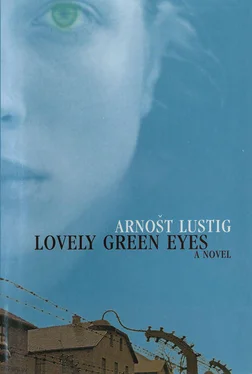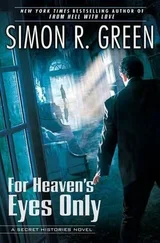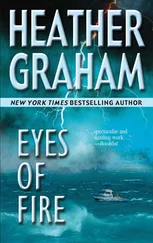“You are entitled to hate them,” he said.
“I’m not sure that’s what I want.”
“Robbing a person of joy is like rape.”
He had not missed what she’d said — that humiliating was like killing.
“I would allow you to hate them,” he said.
“I don’t wish to.”
“No-one would be surprised.”
“Even so.”
“No-one would hold it against you.”
“It isn’t in me,” she said.
It seemed funny that, while she was desperate to eat, the rabbi was seeking answers to something he couldn’t understand.
“You had your back against the wall,” the rabbi said.
“My back and my face,” she corrected him.
“You are righteous.”
“I’d rather be full of laughter.”
Before them was the table, the candlestick, its candle still unlit, several plates, the bread on a wooden cutting-board, butter on a little dish, a salt cellar and cutlery. The rabbi wore an old alpaca jacket which was dirty. After supper she would clean it for him. The dark spots on the knife, fork and spoon handles reminded her of the bloodstains on the floor of Dr Krueger’s surgery and the four castrated young men standing by the wall, their arms hanging, ashamed and frightened while the doctor photographed them.
“I’m a little confused by it all,” she said.
“Would you like to light the candle?”
She didn’t hesitate, but picked up the box of matches from the table, took a match out, held it between her right thumb and forefinger, struck it and carefully lit the wick. The flame flickered for a moment, then steadied and grew.
Tears were running down the rabbi’s cheeks.
Could he have gone insane during those ten days? She did not regard herself as entirely sane, but preferred not to examine herself too closely.
“It’s behind me,” she said finally.
“I hope so,” the rabbi replied.
“Are we going to eat?” she asked.
“We are going to eat.”
Then he said: “Perhaps I believe the way your mother would still believe if she were alive.” It sounded to him as if he were really saying that he didn’t believe any more. Was he hoping to convince himself or her? What did he still not know?
“Everything and nothing,” he whispered. “They took life out of our hands and placed it in the hands of others. They took from us what we knew and let people make decisions about us who did not know us.”
“I pretended to be an Aryan, one of them.”
“You were under duress.”
“I knew I could stay alive as long as I wanted. As long as it depended on me.”
She did not want to make the rabbi cry any more, or they would never sit down to supper. “It could have been worse,” she added.
“To them we were ants, to be stepped on with impunity. Parasitic vermin. A blood poisoning.”
Throughout the past ten days, even though he resisted it, the rabbi had identified her with his daughter Erzika whom they took away when she was 14, nearly 15.
“They robbed you both of your childhood,” he said under his breath.
He chased away the image of her being passed from man to man twelve, 13 or 15 times a day. It was not she who had desecrated the Sabbath or any other day. In her place he would have gone mute. In his mind he saw the waters over which she had flown. She had no butterfly wings, only arms, legs and a belly. To him she seemed like a moon which had disappeared for three years and for 21 days and nights before rising again as a slender sickle and ripening into a full moon.
What was the medication the Oberführer had prescribed to the girls? The injections he had given them? Might Erzika face another rabbi the way Skinny was facing him? Might she, like Skinny, encounter the captain and the Obersturmführer? Had fever come upon him to burn away such thoughts? He had been afraid, right up to this tenth day, to answer the question: what had happened to his wife and daughter, to his sister and brother? He did not want to imagine details. Every one of those who had been lost had been somebody, a mother, a father, a daughter or a son, or a child who had died all alone. On the tip of his tongue was another question he dared not ask. Could Skinny have met his daughter or his wife somewhere? Would he wish to meet them himself?
“Just as there was an ice age, a stone age and an iron age, so in the future people will speak of a concentration camp age,” he said.
She remembered what her mother once told her — that a rabbi was not a priest but a teacher.
He saw blackness before his eyes. He shut them. He opened them again and still saw blackness.
“Aren’t you feeling well?”
The rabbi was thinking of his daughter Erzika, his wife Else and his sister Ella. Ofhis brother, ofhis father and mother. Of all his family whom the Germans had killed while he was in hiding in Hungary.
“Maybe their defeat will make them human again,” Skinny suggested.
“Maybe. I hope so. Maybe their children.”
The rabbi looked into the flame of the candle, which was burning down, and at the slices of bread on the plate. At the foot of the candlestick small piles of wax had congealed.
“What use is an oasis in the desert to those the wind has swept away?” he asked.
She thought this might be a fragment of a prayer. Once she had prayed in No. 232 Ost. She had accused herself of her failings, even though she had not given herself away and no-one had discovered who she was. It was a Wednesday, she was waiting for Thursday. She wouldn’t have minded if she didn’t wake up the next morning. There were worse things than not waking up in the morning. The bread and butter on the table made her think of her brother.
At last the rabbi realized that she wanted to eat. He blamed himself for what he described as his unfeeling dilatoriness.
“Let’s eat,” he said.
In her mind she saw the army kitchen at No. 232 Ost, where the girls had peeled potatoes for the Waffen-S S cook during the night. They would eat the raw peelings, wondering if they’d be allowed to take the frozen potatoes away with them.
“They did not know the Commandments,” the rabbi said.
“They had their own.”
“You were living with the devil,” he said.
“Perhaps.”
“The devil had twelve, 13 or 15 names each day.” The words felt heavy on his tongue.
She could have recited to him the names from her last day.
“The local commander here was called Hans Manfred Wunderkind,” the rabbi said.
“They sometimes had odd names.”
“Every devil has a name.”
“And doctor’s degrees.”
“Devils with doctor’s degrees. With military ranks, birth certificates and citizenships. Every devil has a face.”
“I remember some of them.”
“Some you will forget.”
“I’ll try.”
“Others you’ll never forget.”
“No. I hope not.”
She found it easier to agree with him. She really wanted to eat now. At last they sat down.
“Help yourself,” he said.
“After you.”
“Go ahead.”
“Thank you.”
She took a slice of bread and spread some butter on it, more thinly than the rabbi would have liked. She ate while he thought of all the blood shed during the past six years. He thought of people who no longer needed God, a heart or a soul, who had embraced a new religion. He thought of the problems awaiting those not yet born. What would they wish to know and what would their fathers not want to talk about?
“Isn’t it better not to think about it?” she asked.
“I don’t know,” the rabbi said, using her well-worn phrase.
“I would have given a lot to eat like this at least once during those days.”
“You’ll be dreaming of food even when you’re not hungry.”
Читать дальше


![Корнелл Вулрич - Eyes That Watch You [= The Case of the Talking Eyes]](/books/32103/kornell-vulrich-eyes-that-watch-you-the-case-of-thumb.webp)









